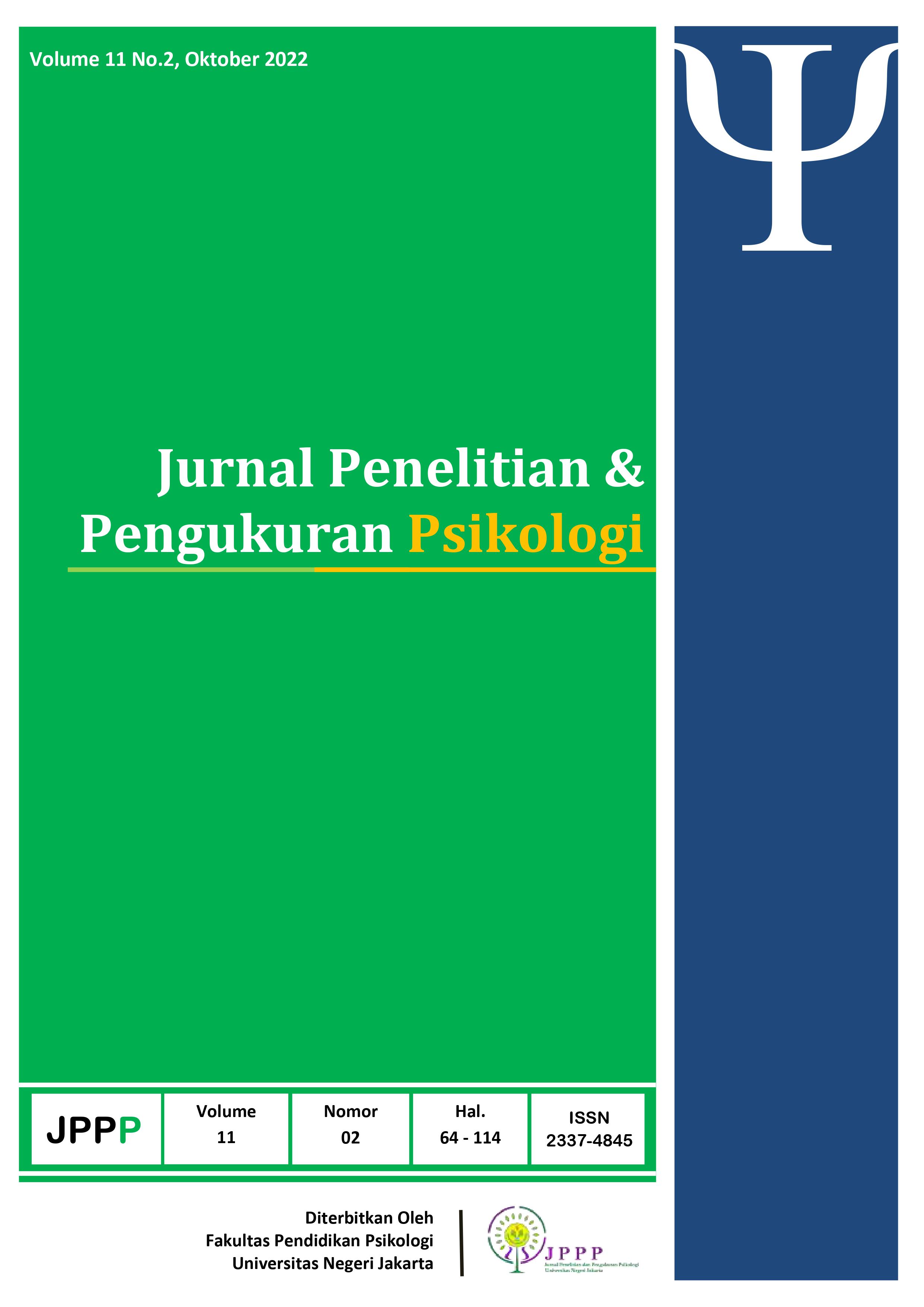Influence of Parent's Verbal Agression Towards Teenagers Self-Concept
DOI:
https://doi.org/10.21009/JPPP.112.05Keywords:
parental verbal abuse, self-concept, adolescentsAbstract
This study aims to analyze the effect of parental verbal abuse on adolescents self-concept. The approach used in this study is quantitative associative with a survey method using questionnaire to collect the data. The population in this study was high school students of SMA Negeri 1 Leuwiliang Kabupaten Bogor, with a total sample of 103 respondents selected with the purposive sampling technique. This study uses tests of normality, linearity, and hypotheses as a pre-requisite test. Based on data result, it is known that majority sample are categorized as low level of parental verbal abuse (69,9%) and the adolescents self concept received by the majority sample are belong to middle category (53,4%). Data calculation which used IBM SPSS Statistics 25 shows that parental verbal abuse has a negative and significant effect on adolescents self concept (P-Value = 0.000 < 0.050. This study shows that the higher parental verbal abuse level, the lower adolescents self-concept, . The coefficient of determination obtained is 27,4%, which means that parental verbal abuse affect on adolescents self-concept by 27,4% and the other 72,6% is influenced by other factors not examined in this study.
References
Brendgen, M., Wanner, B., Vitaro, F., Bukowski, W. M., & Tremblay, R. E. (2017). Verbal Abuse by the Teacher During Childhood and Academic, Behavioral, and Emotional Adjustment in Young Adulthood. Journal of Educational Psychology, 99(1), 26–38. https://doi.org/10.1037/0022-0663.99.1.26
Cooper, J.M. (2016). Bullying: A performance piece addressingemotional and verbal abuse between children. University of Wyoming.
Goñi, E., Madariaga, J. M., Axpe, I., & Goñi, A. (2012). Structure of the Personal Self-Concept (PSC). International Journal of Psychology and Psychological Therapy, 11(3), 509–522.
Jalaludin (2012). Psikologi Komunikasi Remaja. Bandung : PT. Rosdakarya.
Juniawati, D., & Zaly, N. W. (2021). Hubungan Kekerasan Verbal Orang Tua Terhadap Kepercayaan Diri Pada Remaja. Buletin Kesehatan, 5(2), 53–64.
Kochar, R., Ittyerah, M., & Babu, N. (2015). Understanding aggression and trauma in early life: Verbal abuse and cognition in the developing mind. Journal of Aggression, Maltreatment and Trauma, 24(1), 1–19. https://doi.org/10.1080/10926771.2015.982236
Kushendar, K., & Maba, A. P. (2017). Bahaya Label Negatif Terhadap Pembentukan Konsep Diri Anak Dengan Gangguan Belajar. Nidhomul Haq: Jurnal Manajemen Pendidikan Islam, 2(3), 106–113. https://doi.org/10.31538/nidhomulhaq.v2i3.52
Lestari, T. (2016). Verbal Abuse: Dampak Buruk dan Solusi Penanganan pada Anak. Yogyakarta: Psikosain.
Loh, J., Calleja, F., & Restubog, S. L. D. (2012). Words That Hurt: A Qualitative Study of Parental Verbal Abuse in the Philippines. Journal of Interpersonal Violence, 26(11), 2244–2263. https://doi.org/10.1177/0886260510383031
Maisaroh. (2013). Kekerasan Orangtua Dalam Mendidik Anak Perspektif Hukum Pidana Islam. Jurnal Agama Dan Hak Azazi Manusia, Vol. 2, No(2), 261–286.
Nasution, M., & Sitepu, J. M. (2017). Pengaruh Konsep Diri terhadap Coping Stress pada Mahsasiswa FAI UMSU. Jurnal Agama Dan Pendidikan Islam, 9(1), 1–16.
Nindya, P. N., & Margaretha, R. (2012). Hubungan Kekerasan Emosional pada Anak terhadap Kecendrugan Kenakalan Remaja. Jurnal Psikologi Klinis Dan Kesehatan Mental, 1(2), 1–9.
Noh, C. H. C., & Talaat, W. I. A. W. (2012). Verbal abuse on children: Does it amount to child abuse under the Malaysian law? Asian Social Science, 8(6), 224–228. https://doi.org/10.5539/ass.v8n6p224
Nova, S., & Sari, A. (2020). Hubungan Kekerasan Verbal Orang tua dengan Perilaku Remaja di SMPN 20 Kota Pekanbaru tahun 2020. TROPHICO : Tropical Public Health Journal, 1(2), 28–32.







